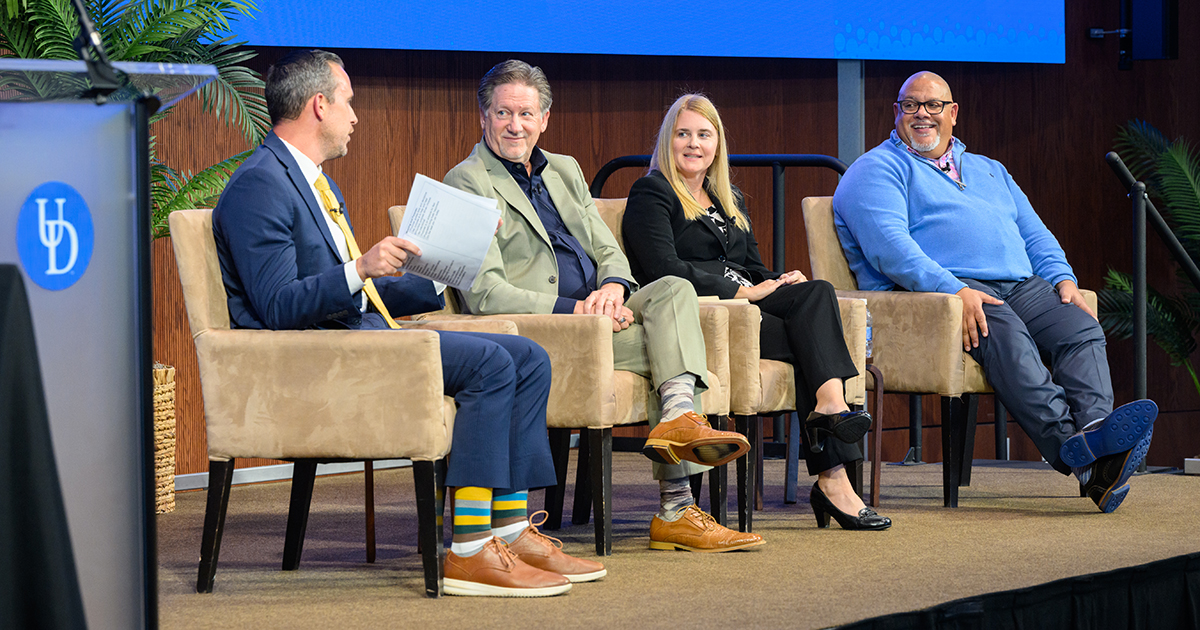
Category: College of Health Sciences
Building resilience together
November 14, 2025 Written by Amy Cherry | Photos by Evan Krape
UD experts urge authentic connection in a digitally distracted world
From economic uncertainty and political discord to personal battles with illness, mental health, and grief, the struggle is real. Simply waking up and putting one foot in front of the other when you don’t feel like it shows resilience.
“We are more connected digitally than ever, yet we have greater loneliness and dissatisfaction with our lives,” said Gregory Cooper, associate director of psychiatric and addiction services at the University of Delaware’s Center for Counseling and Student Development (CCSD).
Cooper was the keynote speaker at the 2025 Evelyn R. Hayes Innovation in Healthcare Symposium, hosted by the College of Health Sciences (CHS) on STAR Campus on Oct. 27.
This year’s symposium focused on cultivating resilience in a tumultuous world.
“Resilience is something we all need to face adversity, adapt, and grow stronger,” said Jillian Trabulsi, interim dean of CHS. "Resilience reminds us progress isn't defined by what we avoid, but by how we respond.”
Since 2014, the Hayes Symposium, made possible through the generous support of Evelyn R. Hayes, Trustees Distinguished Professor Emerita in UD’s School of Nursing, has sought to bring community members, legislators, clinicians, researchers, students, and faculty together to learn and share information to improve Delawareans' quality of life. In a call to action, Hayes encouraged attendees to apply their unique skills to strengthen resilience in clinical practice, education, and communities.
“The past few years have reminded us that resilience isn't optional--it's essential,” Hayes said. “But resilience isn't something we're born with; it's something that we build. It's forged in the fires of experience, shaped by support systems, and strengthened by purpose.”
Post-pandemic, resilience has become a buzzword, shorthand for strength. Cooper challenged that notion:
“Being strong and tough isn’t necessarily resilience. Resilience is not toxic positivity or an Instagram influencer with the perfect lighting and outfit, telling us everything will be OK,” he said.
Instead, he said true resilience is being a self-aware problem-solver—someone who’s flexible, optimistic, and possesses emotional intelligence and self-compassion.
Threats to resilience
Chronic stress from the “always on” culture, the 24/7 news cycle, health neglect, loneliness, and a loss of purpose threaten resilience.
“The data shows that students are no longer coming to college looking for purpose--it’s not even on their radar,” Cooper said.
Digital stress is taking a serious toll.
“The rapid increase in young people’s use of digital media is creating a profound divide between them and the adults in their lives, from parents to educators.”
He likened cellphones to portable anesthesia devices.
“We have the ability, any time we want, to use our phones to check out and escape how we’re feeling,” said Cooper. “We are acquiring the inability not only to manage our feelings but to feel them.”

